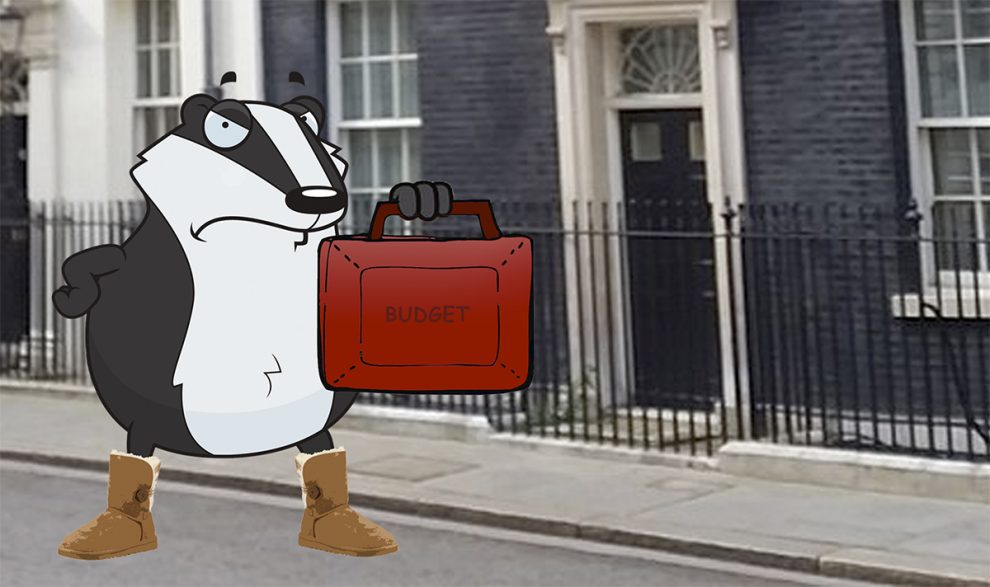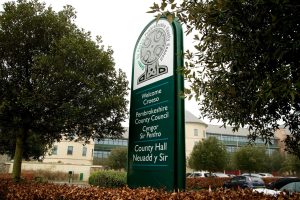THIS coming week is the week exciting things happen involving much money, much faff, a lot of heat, and very little light.
This week, readers, is when the UK Government delivers its budget. In that budget, it will kindly let the Welsh Government know how much wonga it will receive. The Welsh Government will then provide its budget. It will let Wales’ councils, health boards, and other public bodies know how much wonga they will get in that budget.
Shortly after that, and in Pembrokeshire’s case, within 24 hours, the Council will attempt to set its budget. In Pembrokeshire, Bob Kilmister will use last-minute calculations carried out on the back of Jon Haswell’s laptop.
Whatever happens, at whatever level of government, you can guarantee people will moan about having to pay too much towards the cost of providing services they take for granted. More will complain that their pet interests didn’t get enough money.
Badger believes in clarity.
You are all potential voters out there.
You each have the chance to cast your ballots at elections. Whether sending a representative to Westminster, Cardiff Bay or County Hall, you all have the opportunity to vote.
If you can’t be arsed to vote, you forfeit the right to moan about the result. Or at least, that’s Badger’s view.
Let’s look at one of Pembrokeshire’s constituencies.
There are around 60,000 electors in Preseli Pembrokeshire.
In December 2019, 71% of those electors voted in the General Election, which Badger will round down to 70%.
That means 18,000 electors did not vote at all.
Stephen Crabb won with a majority of around 5,100.
Turn to the Welsh Parliament.
At the time of the last election in 2016, there were around 58,000 electors in Preseli Pembrokeshire.
In May 2016, a pinch more than half of those electors turned out to vote in the then-Assembly election.
That means 30,000 electors did not vote at all.
Paul Davies’ majority was a shade under 4,000.
To put that in perspective, Stephen Crabb won 22,000(ish) votes in December 2019. That’s only 8,000 fewer votes than were cast IN TOTAL in May 2016 in the same constituency.
Non-stop moaning about Westminster or Cardiff Bay can be expected from those who voted for losing candidates. But the amount of bitching that goes on from the sort of moron who says ‘I don’t vote, it only encourages them’ is self-indulgent rot. Tough luck! You couldn’t be bothered to even try to change things, so stop complaining when they don’t turn out as you would like.
Let’s drill down a little further.
Pembrokeshire County Council’s last elections were in 2017.
There are sixty seats on the Council. Twelve of the current Council didn’t even have to face the electorate.
The turnout in May 2017 was 47.50% of available electors.
More than half of electors who could’ve voted didn’t make the short walk to the polling station to cast a vote.
Subtract from the total number of council seats the number of uncontested seats, and 48 elections remain.
Out of those 48 elections, 19 were won by 100 votes or less.
Of those 19, 9 were won by fewer than 30 votes. That’s fifteen votes or fewer to the winner and those votes heading to the runner up, and you’d have a different looking council than the one you have now.
Yep, if you vote, you only encourage them…
And if you don’t vote, you get what someone else thinks you deserve or what in – almost every case – a councillor fewer than half of you care about enough to change.
Chew on that for a moment while Badger draws breath.
Phew.
The Westminster Government has spent hundreds of billions and misspent tens of billions tackling the Covid pandemic. It’s done that through borrowing. All of that must be repaid, however long it takes us. We finished paying what we owed the Yanks from WW2 sometime around 2006. That was despite being the single biggest recipient of Marshall Aid in Europe after 1945.
The current government will fiddle around the margins of taxation but will almost certainly not directly increase income tax. For the record, what we spend on migration policy in a year – just for the hard of thinking – wouldn’t pay for a single general hospital’s construction.
That leaves only one place from which repayments can come – that’s current expenditure. It’s the money the government spends on services each year. In turn, that will mean less money for the Welsh Government. That – as sure as eggs is eggs – means less money for councils, health boards, and other Welsh public bodies.
You will hear a lot about ‘real terms’ funding increases, ‘net increases’, and funding increases in line with inflation next week.
They are – almost without exception – weasel words for less money.
Let’s imagine the Welsh Government announces it is to invest £100m in building the largest weasel farm in Europe (it’s invested in stupider). Cardiff Bay then commits to providing Mega-Weasel with support of £10m a year for the ten years after it’s opened.
By the end of year ten, the £10m is worth far less than in year one. That’s not only down to inflation. It’s down to increased costs associated with tax, national insurance, capital depreciation, pensions, regulatory costs, and a range of other levies paid to the Westminster government over and beyond regular inflationary changes.
In the same way, crude inflation-equalling rises in council budgets go nowhere near absorbing the costs of providing services. There are other costs simply not taken into account. One recent example was the decision to increase teachers’ pensions. The cost consequences of a decision made in Parliament weren’t discussed with local councils. No wonder English councils are on the bones of the arse, being bailed out or going bust!
That decision affected Welsh councils, too. They were left in limbo until a temporary patch was put in place. That still leaves them in the hole in future years. That means less money for other things.
Less money for councils means less money for services. Less money for services means fewer and worse of them.
Pembrokeshire is in the unique position of deliberately impoverishing itself for twenty years. It gets, therefore, £15m less a year than the Welsh Government thinks it needs to provide services.
The prices paid by the Council for power, supplies, maintenance, wages, pensions, tax, national insurance rises each year. This year, the Council has lost income hand over fist. One-off grants here and there won’t fill the holes. Every Council in Wales is in the same boat. Some, in England, are functionally insolvent.
The Westminster Government will pass its budget. The Cardiff Bay Government will get its own through. In Pembrokeshire, there’ll be a fight.
On the one hand, you have those who favour the approach of the maudlin drunk of Frank Sinatra’s My Way, howling defiance at the reality of being urine-soaked and skint in a doorway at three in the morning.
On the other, there’s a pessimistic realism that this isn’t a Frank Sinatra song.
And, if it is, it’s definitely not the one in which The Best is Yet to Come.



















Add Comment